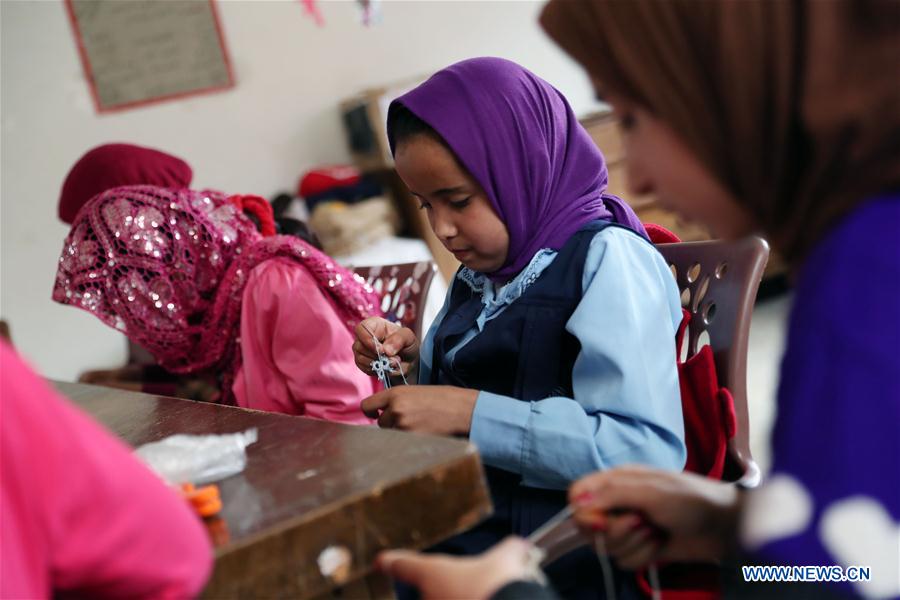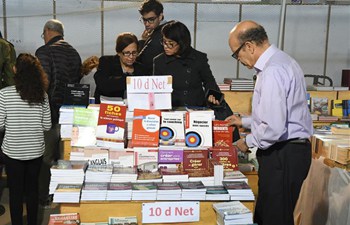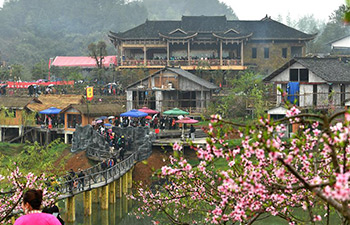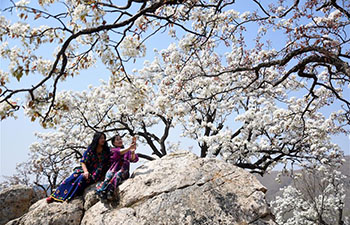
People sew handmade products at a village workshop in Beheira, Egypt, April 1, 2019. In Beheira province, north of Egypt, the residents of a small village have succeeded in overcoming extreme poverty in five years by growing organic vegetables on the rooftops of their homes. "The roofs that were once a source of hazard have now become a great source of income for the majority of residents here," Ragab Rabie, village chief and one of those who started the rooftop farming, told Xinhua. A few yards from Rabie's one-storey house, a new construction of two big rooms embraced dozens of females of all ages who meticulously weaved carpets. "We have more than 130 girls working at the carpet workshop," Yasmin Adel, the workshop supervisor, told Xinhua. (Xinhua/Ahmed Gomaa)
by Ahmed Shafiq
BEHEIRA, Egypt, April 7 (Xinhua) -- In Beheira province, north of Egypt, the residents of a small village have succeeded in overcoming extreme poverty in five years by growing organic vegetables on the rooftops of their homes.
Nag Oun, a small village with 200 homes, was once one of the poorest areas in Egypt with a high unemployment rate that exceeded 90 percent.
However, the village's residents came up with the idea of rooftop gardening to eradicate poverty and build a brighter future of their coming generations.
To start the project, the residents had to get small loans to replace the old shabby straw roofs of their homes with new concrete ones.
They said that straw and steel roofs could not protect them in winter and summer, adding that snakes, insects and rats could easily get into their homes through the old roofs.
"The roofs that were once a source of hazard have now become a great source of income for the majority of residents here," Ragab Rabie, village chief and one of those who started the rooftop farming, told Xinhua.
"We managed to bring down the unemployment rate from 90 percent to less than five percent," Rabie said.
The residents, who own no farms in the tiny village, are now making a boom adopting hydroponics and organic agriculture systems to grow their crops.
"This system uses less water than traditional methods," the middle-aged man said as he checked plants of green beans on his rooftop after a rainy night.
He added that those who do not use their rooftops are growing vegetables in spaces in front of their homes.
Rabie said that the villagers now sell 70 percent of their products to local markets and keep the rest for their own use.
He pointed out that the prices of organic vegetables are notably higher than those grown with pesticides, which helped the residents to save money to start new projects such as livestock and poultry growing.
"People here work as one unity and that is why we are making success," Rabie said.
A few yards from Rabie's one-storey house, a new construction of two big rooms embraced dozens of females of all ages who meticulously weaved carpets.
"We have more than 130 girls working at the carpet workshop," Yasmin Adel, the workshop supervisor, told Xinhua.
The lady, in her late 20s, said that the project started three years ago with five girls, who later taught tens of women, young ladies and even teenagers how to weave carpets.
"We started with two traditional carpet looms donated by some well-to-do people, and then we bought four more looms," Adel said as she observed young weavers knotting wool and silk carpets with their hands.
She added that the business is growing rapidly as they receive orders from various cities including the capital Cairo and they have exported five carpets to Saudi Arabia and Canada.
"This helps the families to earn more money and boost the economy of the village as well," she said, adding that schoolgirls come to the workshop after they finish their classes.
"In addition to the carpet workshop, we also have small sewing and carpentry workshops where dozens of young people work," Adel added.
Nag Oun has become an example of resilience and self-sufficiency that is being followed by a number of other villages.
"We have passed this model to neighboring villages and they are working well ... We can eliminate poverty in Egypt if all poor areas follow our steps," Rabie said.











